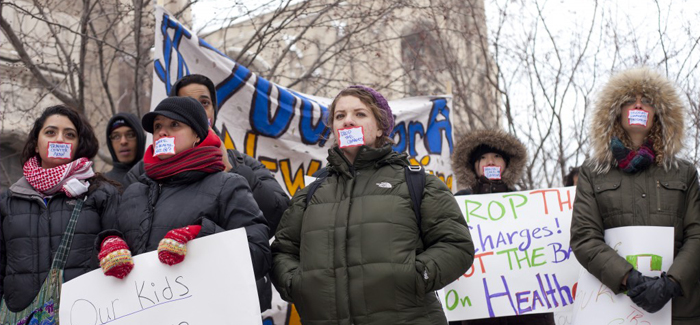
Campus protests this past winter sparked a dialogue about protesting itself. (Chicago Maroon)
Two campus protests prompt an independent investigation and new policy recommendations.
An external investigation found that campus police acted appropriately during a January 27 demonstration at the medical center where four people were arrested, but the report called a commanding officer’s actions “unreasonable” in ordering undercover surveillance of a February 23 protest. The commanding officer is no longer employed by the University police.
The two demonstrations were calling for a level 1 trauma center on the South Side of Chicago. On January 27 about 40 protesters took advantage of a scheduled tour to access the lobby of the Center for Care and Discovery, which had not yet opened. Once inside, chanting protesters used bullhorns with sirens, creating what the investigator’s final report called “an atmosphere of confusion and chaos.” Campus police tried to usher the protesters out, the report said, and in the ensuing confrontation officers followed proper procedures in conducting the arrests.
The February 23 protest proceeded without incident, but days later the Maroon reported the presence of an undercover campus police officer. In a March 3 e-mail to the University community, President Robert J. Zimmer and Provost Thomas F. Rosenbaum called the decision to have an officer pose as a protester “totally antithetical to our values,” and the University retained Patricia Brown Holmes of the Chicago law firm Schiff Harden to lead an investigation into the events surrounding both protests.
In response to Holmes’s May report, Nim Chinniah, executive vice president for administration, and Karen Warren Coleman, vice president for campus life and student services, have identified steps “to support protest as a legitimate and important form of free expression at the University.” The steps include new campus police procedures related to protests, better communication of University demonstration policies, and training for leaders of student organizations.
Faculty-led panels formed in the wake of the protests and a review by the committee on dissent and protest will produce further suggestions, Chinniah and Coleman said in their response, and “we are committed to taking additional actions as a result of recommendations coming out of those discussions.”
